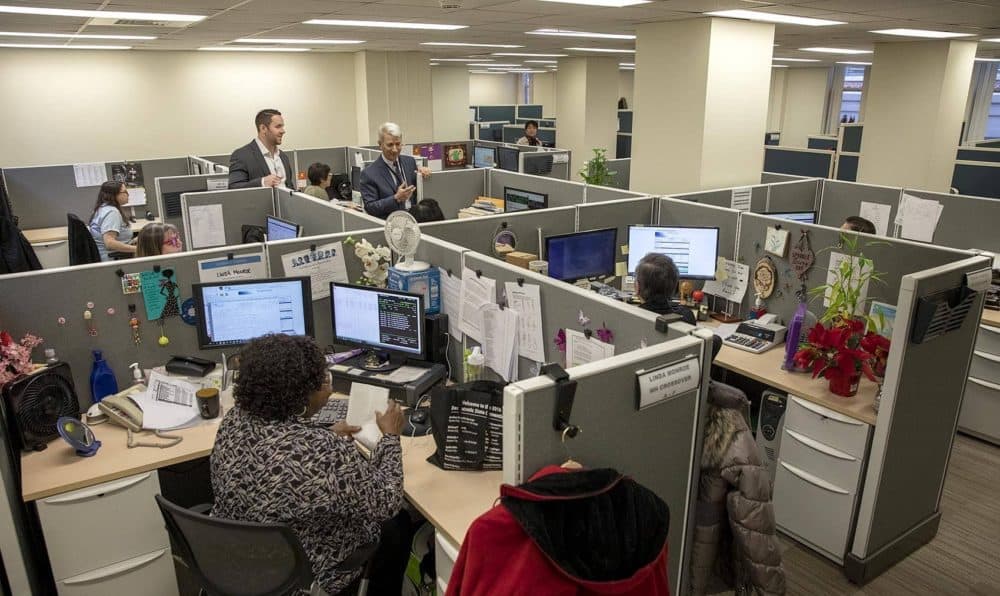Advertisement
Boston Hospital Leader: U.S. Health Care Has A Bureaucracy Problem
Resume
Dr. Mike Apkon is wending his way through cubicles at Tufts Medical Center, in a department where 85 workers spend their days mainly making sure patients have insurance coverage for the care they need.
In an ideal world, I ask him, how many staffers would there be in this department?
"In an ideal world," he says, "none."
I feel a brief pang for the desk-bound employees whose hospital leader has just imagined a world without them, and prompt him, "Which isn't to say you don't value the staff."
"No, the staff are incredibly valuable," Apkon clarifies, "because it's the only way that patients can get care here without us having to bill the patients directly. So it's an essential role in the system as it's currently created, but it really is there to deal with the administrative complexity that sits between the patient, the payer and the provider."
'Administrative complexity': that's the health policy term for every time you've tried and failed to understand a medical bill. Or needed multiple phone calls to get prior approval from your insurance company for care you needed.
That complexity is increasingly seen as a massive and growing problem in the American health care system. A study published this month estimates that the country's health care bureaucracy costs over $800 billion a year. Other estimates range closer to $500 billion a year.
At Tufts Medical Center, a major teaching hospital with 415 beds in Boston's Chinatown neighborhood, President and CEO Mike Apkon is speaking out about the issue from a rare perspective: He spent years in Canada and came home a changed man.
He grew up in Framingham, Mass., and has an MD., a Ph.D. and an MBA. He has worked at some of America's most prestigious hospitals and in health care systems around the globe.
In 2014, he took the top job at the renowned Hospital for Sick Children in Toronto.
"I went to Canada with the belief that the U.S. health care system was the best in the world," he says.

After nearly five years in Toronto, he didn't see the Canadian single-payer system as perfect, but he admired how it freed patients — and hospitals — from most medical bills.
And after taking over at Tufts Medical Center, he saw a stark contrast in the cost of bureaucracy: the hospital he led in Toronto was about the same size — with just over a billion dollars of revenue a year.
"The cost of managing the prior authorization and billing and collections function for all of that $1.2 billion of revenue in Toronto was roughly $1.4 million," he says. "At Tufts Medical Center, that cost is about $54 million."
More than 200 people at Tufts Medical Center work in departments that handle billing and insurance functions — almost one per occupied hospital bed.
'The frustration is really apparent everywhere'
Apkon leads the way on a tour of some behind-the-scenes rooms that patients rarely see, including the case management department, where director Shelley Dietz describes the controlled chaos that comes with managing patient paperwork from multiple health insurers that each have multiple plans that can also be customized depending on the patient's employer.
"We have a million faxes that come back and forth," she says. "We do it online, the fax machine is going all day. The phones are usually going all day long."
When Apkon talks about how a simpler system could mean fewer jobs like the cubicle work in this department — but more jobs at the bedside or helping with social services — Dietz doesn't get defensive.
"I think that would be our dream," she says. "If we could do more for our patients and really less for the administrative burden of our insurers."
In November, Apkon spoke about administrative complexity at the gathering that's the high point of the health policy year in Massachusetts: the annual state hearing on health costs.
The state Health Policy Commission is looking at complexity and its consequences, testified its executive director, David Seltz, "including confusion and anxiety for patients, provider burnout, and organizational distraction from other priority areas."
Administering this complex system also costs a lot of money, an estimated 14% of national health care spending, he testified, and in Massachusetts, health plan administrative costs have been rising rapidly.
"I think people are getting increasingly fed up," says commission member David Cutler, a Harvard health economist.
It's time for concerted collective action to fight health care complexity, he says, just as Massachusetts pulled together to pass universal insurance coverage and then to slow the growth of health costs.
"And now we need to do it again around the administrative component," Cutler says. "I think there's so much frustration on the part of providers, insurers and patients, that there's really an opening to do this. That is, there's really no constituency for increasing the level of administrative complexity further, and the frustration is really apparent everywhere."
Lora Pellegrini, head of the Massachusetts Association of Health Plans, says insurers are on board to simplify — with a couple of caveats. She emphasizes that the big problem is health care prices, not paperwork. And "people want choice. That's what Americans are used to, is broad choice. And with that, can come some complexity."
But she says insurers have an obligation to work together with doctors and hospitals to streamline health care paperwork, and there has been some progress in recent years — like the shift to most claims being paid electronically. She sees presidential campaign politics as a big part of why administrative complexity is a hot topic these days.
"The single-payer advocates want to push their agenda," she says, "and so a great way to push it is to talk about administrative complexity and 'You're paying for all this administration.' Nirvana's right around the corner."
Apkon is not an advocate for a single payer system — he sees value in competition, and "that path is too disruptive for us to get to in any conceivable near-term future."
But he does believe the system needs fundamental change.
"I think we have a positive feedback loop that will keep accentuating the propensity for administrative complexity, higher costs and growing disparity," he says.
"Health care should be about turning cash into caring, you know? And it's become turning cash into jobs and other things way too much. Nobody intended it to be that way. But it's an unintended consequence of everyone playing the parts in which they've been cast."
This week, the Health Policy Commission said it was starting to dig into prior authorization — that's when you need advance insurance approval to get care — and how to simplify at least that bit of complexity.
This segment aired on January 17, 2020.
